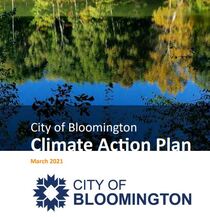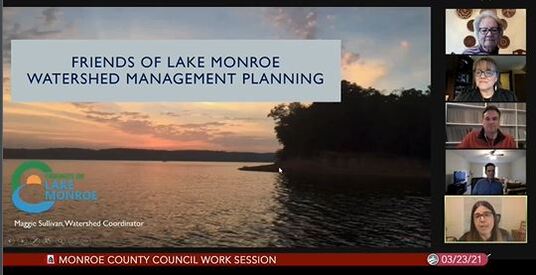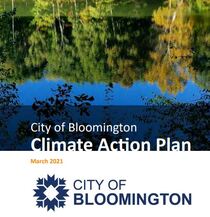 Bloomington City Council will be voting to accept the city's Climate Action Plan on April 21. It is a companion document to the Sustainability Action Plan, which was adopted in 2018. The CAP focuses on ways to reduce community greenhouse gas emissions and build climate resilience. Click here to read the full Climate Action Plan.
0 Comments
 Friends of Lake Monroe's Maggie Sullivan briefed Monroe County Council on the development of a watershed management plan at the council's March 23 work session. The project is creating a plan of action for addressing water quality goals by identifying problems and solutions with the watershed, a 440-square-mile area around Lake Monroe. Built in 1964 as a reservoir, Lake Monroe is the largest lake in Indiana and the primary water source for this region. Click here to watch the presentation on CATS.  A draft of the City of Bloomington's Climate Action Plan has been released. It will be reviewed by the Bloomington Council's Climate Action & Resilience Committee at their Nov. 17 meeting. The city hired paleBLUEdot as a consultant to help develop the plan. It lists goals in these eight categories: 1) transportation and land use, 2) energy and built environment, 3) waste management, 4) water and wastewater, 5) local food and agriculture, 6) health and safety, 7) greenspace and ecosystem health, and 8) climate economy. The city is also asking for feedback on the draft plan. Click here to take a survey. Click here to read the draft Climate Action Plan.  In a speech on Thursday called "Recovering Forward," Bloomington Mayor John Hamilton proposed a raft of spending initiatives aimed at boosting the local economy in the wake of the COVID-19 pandemic, including a new 0.25% local income tax. From his speech: "I know it is rarely popular to raise revenues, and that it is not easy during times of economic pressure. But we cannot Recover Forward without it. Without it, we will shortchange our future and Bloomington’s potential. And, being one of the lowest-tax cities in a low-tax state in one of the lowest-tax countries, we have fiscal room to do so. Recover Forward lets us dedicate these resources toward those most in need, and toward the Bloomington we want to become." Click here for a transcript. A video of his speech is available at the bottom of that page. In January, the mayor proposed an 0.5% local income tax for sustainability initiatives, but that proposal was abandoned when the pandemic hit. The mayor does not have the authority to enact a local income tax (LIT). It would need to be approved by the elected fiscal authorities in Monroe County, including the Bloomington City Council and Monroe County Council, in weighted votes based on the proportion of the population that elected officials of each entity represents. Because Bloomington is the largest population base, an eight-vote majority of the Bloomington City Council could pass a LIT for the entire county. About half of the proceeds would go to the county government.  Panelists in the WFIU studio. Panelists in the WFIU studio. A lively discussion on the proposed local income tax increase was the focus of the March 6 WFIU Noon Edition. Panelists included Mary Morgan, the Chamber's Director of Advocacy & Public Policy; Bloomington Mayor John Hamilton; Bloomington City Councilmember Matt Flaherty; and Ellettsville Town Councilmember William Ellis. Click here to listen. The panel was moderated by WFIU's Bob Zaltsberg and Sara Wittmeyer, who also took questions from listeners calling in or emailing. The Chamber has not yet taken a position on the income tax proposal, as few details have been provided about how the money would be spent in the proposed Sustainability Investment Fund. We continue to advocate for transparency and accountability in all aspects of government, as well as for broad public engagement in decision-making.  The City of Bloomington is hosting a forum on Thursday, March 5 to discuss priorities for a new Sustainability Investment Fund and a possible increase in the local income tax to support the fund. The event runs from 7 to 9 p.m. at The Mill, 642 North Madison St. According to a city press release, the format will include a brief presentation, followed by opportunities to discuss topics with subject-matter experts. Those topics include the city's "comprehensive response to climate change, how the fund might support social equity, and the possibilities the fund could create in areas from transit and other mobility options to sustainable housing and green infrastructure, among others." A light meal will be provided. The city is also asking residents to share comments and suggestions about the Sustainability Investment Fund via this online form. On Jan. 1, Mayor John Hamilton announced a proposal to increase the local income tax by 0.5% for Monroe County residents, raising about $16 million annually – half for the city, half for the county – to be used for economic development purposes. Hamilton proposed using the city's share for sustainability initiatives that have not yet been determined. The tax could be enacted if approved by the majority of the Bloomington City Council. |
Categories
Categories
All
Archives
Archives
May 2024
|
|
Copyright The Greater Bloomington Chamber of Commerce. All Rights Reserved.

 RSS Feed
RSS Feed
